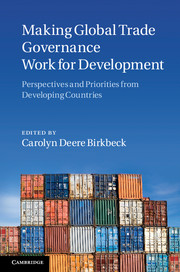 Making Global Trade Governance Work for Development
Making Global Trade Governance Work for Development Book contents
- Frontmatter
- Contents
- Figures
- Tables and boxes
- Contributors
- Acknowledgements
- Introduction
- Part I Global trade governance
- Part II Roles and responsibilities in global trade governance: diversity in developing country priorities and strategies
- Part III Strengthening multilateralism
- 10 The WTO, democracy and development: a view from the South
- 11 Reclaiming development in the world trading system (revisited): proposals for reform of WTO governance
- 12 Fostering developing country engagement in the WTO dispute settlement system
- 13 Rethinking the governance of Aid for Trade
- 14 Strengthening WTO surveillance
- 15 Why not an ombudsperson at the WTO? A proposal for debate
- Part IV Making WTO negotiations and decision-making processes fairer
- Part V Conclusion
- Index
- References
13 - Rethinking the governance of Aid for Trade
from Part III - Strengthening multilateralism
Published online by Cambridge University Press: 07 September 2011
- Frontmatter
- Contents
- Figures
- Tables and boxes
- Contributors
- Acknowledgements
- Introduction
- Part I Global trade governance
- Part II Roles and responsibilities in global trade governance: diversity in developing country priorities and strategies
- Part III Strengthening multilateralism
- 10 The WTO, democracy and development: a view from the South
- 11 Reclaiming development in the world trading system (revisited): proposals for reform of WTO governance
- 12 Fostering developing country engagement in the WTO dispute settlement system
- 13 Rethinking the governance of Aid for Trade
- 14 Strengthening WTO surveillance
- 15 Why not an ombudsperson at the WTO? A proposal for debate
- Part IV Making WTO negotiations and decision-making processes fairer
- Part V Conclusion
- Index
- References
Summary
Aid for Trade is an important development initiative. It gives concrete expression to the objective of securing greater developing country participation in international trade, which is vital for promoting the global public good of a rules-based international trading system. Yet the complicated arrangements for the ‘governance’ and implementation of the Aid for Trade initiative make it challenging for developing countries to access the available resources. In its current form, Aid for Trade governance is at best ambivalent when it comes to the declared mission of supporting developing countries to build trade capacity, overcome supply side constraints and profit more fully from the international trading system. Moreover, there is a deficit in the institutional arrangements regarding access to and predictability of Aid for Trade resources. This is reflected in the skewed distribution of Aid for Trade across countries: in 2008, out of over a hundred eligible countries, the top twenty recipients captured 70 per cent of all Aid for Trade commitments (OECD 2010a).
The objectives of this chapter are twofold. First, it outlines the institutional arrangements for the governance and implementation of Aid for Trade. Second, it argues that as Aid for Trade has evolved, the key governance principle guiding implementation has become the mutual accountability of donors and beneficiaries, whereas equally important principles of access to and predictability of resources are much less prominent.
- Type
- Chapter
- Information
- Making Global Trade Governance Work for DevelopmentPerspectives and Priorities from Developing Countries, pp. 352 - 393Publisher: Cambridge University PressPrint publication year: 2011
References
- 1
- Cited by
